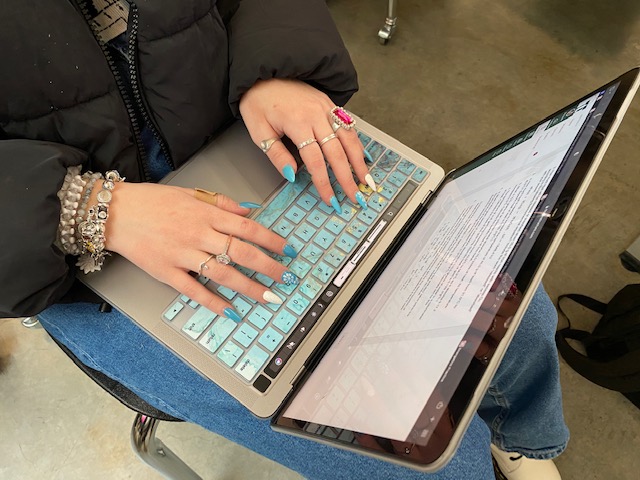Pencil or keyboard?
Technology changes the nature of classroom learning
A student pulls out her laptop to take notes in class. Technology has changed the way students learn.
January 7, 2022
During class my teacher told us now would be a good time to take notes. I instinctively reached for a pen and paper and was greeted with the sight of everyone in my class reaching for their chromebooks instead. At this particular moment I had realized just how much the way we experience technology in our day-to-day lives had changed.
Many of us have noticed, especially after all the time of distance learning within a worldwide pandemic, the ever growing presence of technology in schools all around the country. What place does technology have in not only our classrooms today but the future, and what form should it take?
Note taking, which at first glance might seem kind of insignificant, actually proves to be a good measure of the effectiveness of technology; as it has a lot of overlap with the other ways we do things digitally. It also carries a measurable effect on the way students learn and apply knowledge learned.
Why do we even take notes in the first place?
Apart from the purpose of memory recall itself, it pushes students to stay alert and focus during lectures or while reading textbooks. Note taking also helps you learn; studies on learning such the 2014 study titled The Pen Is Mightier Than The Keyboard by Pam A. Mueller and Daniel M. Oppenheimer have shown that actively engaging with a topic by listening and then summarizing what you hear helps you understand and remember the information later. According to a 2004 study by Scott Titsworth and Kenneth Kiewra, note taking results in about 13% higher test achievement than not taking notes especially when combined with cued lecturing.
So what about taking notes electronically?
The rapid digitization of the school environment brings many benefits whether that be accessibility, speed, ease of use, or even helping education survive a pandemic. Amidst all the excitement and novelty of a digital school environment I think we’ve forgotten the value of the analog. I think the phenomenon deserves a second look, a second look as to whether our computers and software truly benefit us in all the ways we once imagined it would.
Although digital note taking is often much faster, convenient and easier to transcribe with, it’s not without its drawbacks.
When writing notes by hand I noticed I tend to remember more and do a lot more paraphrasing than I would normally. I would imagine less paraphrasing and taking more notes verbatim would actually prove beneficial, but the opposite seems to be true with paraphrasing actually helping you improve and retain memorization.
“One might think that the detriments to encoding would be partially offset by verbatim transcription leaving a more complete record for external storage, which would allow for better studying from those notes. However, we found the opposite—even when allowed to review notes after a week’s delay, participants who had taken notes with laptops performed worse on tests of both factual content and conceptual understanding relative to participants who had taken notes longhand.”
However, note taking with computers isn’t all bad as there are ways digital note taking surpasses physical; then there is what looks to be the promising future of tablet note taking with some studies like the 2021 Paper Notebooks vs. Mobile Devices: Brain Activation Differences During Memory Retrieval by Keita Umejima, Takuya Ibaraki, Takahiro Yamazaki and Kuniyoshi L. Sakai concluding tablet assisted note taking to be an almost happy medium of convenience and effectiveness.
But enough of the effectiveness of technology and more about our day-to-day interactions with technology in the school environment. A question I’d really like us to ask is “has the use of technology become overbearing or ever over complicated once simple tasks?” In such an organic and fluid environment do such rigid mechanical systems always prove to be most effective?
I will admit bias for originally coming into this with a preference for physical. Over the course of writing this I realize I haven’t left in with the same view that I’d gone in with. I’ve discovered while the analog definitely carries many benefits over the digital, it would be foolish to completely reject technologies’ embrace. Technology most definitely offers us a wealth of benefits, but I think instead of running into the future we should instead walk. Walk into the future not with fear but with a degree of caution, unafraid to keep our old ways of doing things even in the face of rapid innovations.
I’m not sure if I believe the classroom should be the frontier for the ongoing experiment of technology and education. For the time being I think technology’s place shouldn’t be that of a main course but a side, a compliment to the analog.
I think perhaps the advent of the digital classroom is too young for any truly solid information to be present. If i were to give one piece of advice it would be never be afraid to experiment nor afraid to give what is now widely seen as archaic or even obsolete a chance.










